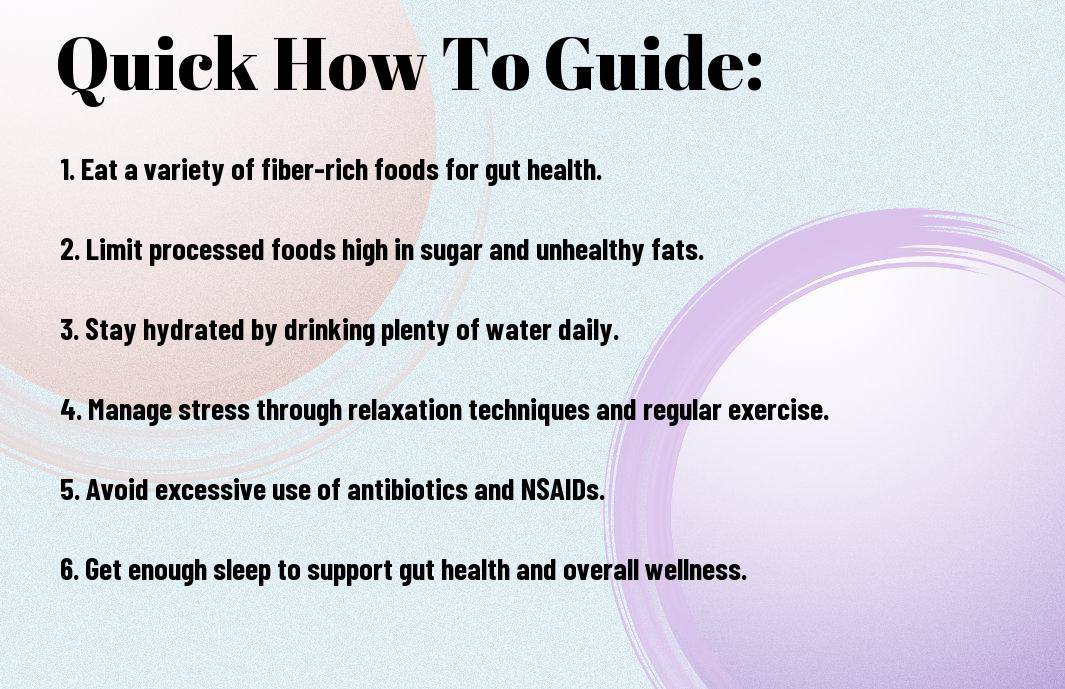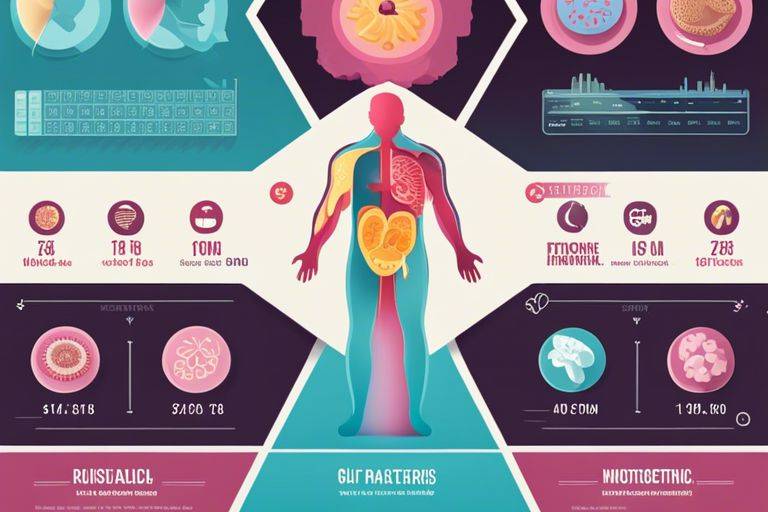Most of us are unaware of how crucial it is to take care of our gut health. A healthy gut is not only crucial for proper digestion but also plays a critical role in overall well-being. In this blog post, I will share simple and effective tips to help you keep your gut happy and healthy. By following these easy suggestions, you can enhance your health and avoid damaging your gut in the long run.
Key Takeaways:
- Avoid processed foods: Consuming processed foods can harm your gut health due to their high levels of sugar and unhealthy fats.
- Eat a diverse range of foods: A varied diet rich in fruits, vegetables, whole grains, and lean proteins can promote a healthy gut microbiome.
- Manage stress: Chronic stress can negatively impact your gut health, so it is important to find healthy ways to reduce stress levels.
- Stay hydrated: Drinking an adequate amount of water is vital for maintaining good gut health and overall well-being.
- Get enough sleep: Lack of sleep can disrupt the balance of bacteria in your gut, so aim for 7-9 hours of quality sleep each night.
- Limit antibiotics: Overuse of antibiotics can harm the beneficial bacteria in your gut, so only take them when necessary and always follow your doctor’s instructions.
- Consider probiotics: Probiotic supplements or foods containing live cultures can help maintain a healthy balance of gut bacteria and support digestion.


Understanding Gut Health
What is Gut Health?
To understand gut health, it’s imperative to grasp the delicate balance of bacteria and microorganisms in your gastrointestinal tract. The gut is home to trillions of bacteria, which play a crucial role in digestion, nutrient absorption, and immune function.
Importance of Gut Health for Overall Well-being
Even though you may not realize it, your gut health impacts every aspect of your well-being. Imbalances in the gut microbiome can lead to various health issues such as bloating, indigestion, fatigue, and even affect mental health. Maintaining a healthy gut is crucial for optimal immune function, nutrient absorption, and overall vitality.
It’s important to note that a healthy gut can improve your energy levels, mood, and overall health. By nurturing your gut with nutrient-dense foods and avoiding processed and sugary treats, you can support a thriving microbiome and ensure your well-being.
Factors That Damage Gut Health
Some factors can harm your gut health and lead to digestive problems, nutrient malabsorption, and overall health issues. It’s vital to be aware of these factors and take steps to prevent them for better well-being. Assume that by avoiding these damaging elements, you can support a healthier gut.
Poor Diet and Nutrition
Even with the busyness of life, it’s crucial to prioritize good nutrition for the sake of your gut health. A diet high in processed foods, sugars, and unhealthy fats can disrupt the balance of good bacteria in your gut and contribute to inflammation. Opt for whole, nutritious foods to nourish your body and support a healthy gut flora.
Stress and Anxiety
Nutrition plays a vital role in managing stress and anxiety. A diet rich in fruits, vegetables, whole grains, and lean proteins can help reduce stress and anxiety levels. Additionally, incorporating mindfulness practices such as meditation, deep breathing exercises, or yoga can be beneficial for overall mental and gut health.
Lack of Sleep and Relaxation
The quality of your sleep directly impacts your gut health. Inadequate sleep can disrupt the balance of gut bacteria and increase inflammation in the body. Make it a priority to get 7-9 hours of quality sleep each night and incorporate relaxation techniques such as reading, listening to music, or taking a warm bath to support your gut health.
Antibiotics and Medications
Factors such as antibiotic use can disrupt the delicate balance of bacteria in your gut. Overuse or misuse of antibiotics can lead to dysbiosis, where harmful bacteria outweigh the beneficial ones. For instance, always consult your healthcare provider before taking antibiotics and consider probiotics to restore gut health after a course of antibiotics.
Environmental Toxins and Pollutants
Environmental toxins and pollutants can also impact your gut health. Pesticides, heavy metals, and other toxins in our environment can disrupt the gut microbiome and lead to inflammation. Medications like non-steroidal anti-inflammatory drugs (NSAIDs) can also harm the gut lining. Be mindful of your surroundings and minimize exposure to toxic substances for better gut health.
How to Identify Gut Health Issues
Common Symptoms of Gut Imbalance
Identify common symptoms of gut imbalance by paying attention to signs such as bloating, gas, diarrhea, constipation, and food intolerances. These can indicate an imbalance in your gut bacteria and digestive system.
Signs of Gut Damage and Dysfunction
Identify signs of gut damage and dysfunction by looking out for symptoms like chronic fatigue, unexplained weight changes, skin issues, and mood swings. These can be indicators that your gut health is compromised.
A
If you are experiencing frequent bloating, indigestion, or stomach discomfort, it could be a sign of gut damage. Factors such as poor diet, stress, medication, and excessive alcohol consumption can contribute to gut dysfunction.
When to Seek Professional Help
Now, if your gut health issues persist despite making dietary and lifestyle changes, it might be time to seek professional help. A healthcare provider or a registered dietitian can help you identify the root cause of your gut issues and provide personalized recommendations for improvement.
The key is to pay attention to persistent symptoms that are affecting your daily life and overall well-being. Seeking professional help can lead to a proper diagnosis and an effective treatment plan to restore your gut health.

Simple Tips for Better Gut Health
Not taking care of my gut health can lead to various health issues, so I focus on some simple tips to keep my gut happy and healthy. Here are a few practices that I follow:
Eat a Balanced Diet Rich in Fiber and Probiotics
You should aim to include plenty of fiber in your diet through fruits, vegetables, whole grains, and legumes. Additionally, incorporate probiotic-rich foods like yogurt, kefir, and sauerkraut to promote good gut bacteria. Assume that a balanced diet supports a diverse microbiome and overall gut health.
Stay Hydrated and Limit Processed Foods
Stay hydrated by drinking enough water throughout the day, and limit your intake of processed foods high in sugars and unhealthy fats. With proper hydration and a diet rich in whole foods, my digestive system functions better, reducing the risk of gut issues.
With adequate hydration, my body can maintain optimal digestion and nutrient absorption, while reducing the strain on my gut caused by processed foods.
Manage Stress with Exercise and Mindfulness
Hydrated and stress can have a significant impact on gut health, so I incorporate regular exercise and mindfulness practices like yoga or meditation into my routine. Mindfulness helps me manage stress levels, which in turn supports a healthy gut environment.
Get Enough Sleep and Practice Good Sleep Hygiene
Probiotics getting enough sleep and establishing a bedtime routine are crucial for gut health. It allows my body to repair and regenerate, supporting a healthy balance of gut bacteria. It is also a time when my gut can rest and recover, promoting overall well-being.
Consider Supplements and Probiotics
Even with a nutritious diet, I sometimes consider supplements like probiotics to further support my gut health. A high-quality supplement can provide additional beneficial bacteria that may be lacking in my diet, enhancing my overall digestive wellness.

Lifestyle Changes for Gut Health
Incorporating Fermented Foods into Your Diet
Unlike other foods, fermented foods are wonderful for your gut health. To promote the growth of healthy gut bacteria, try adding fermented items like kimchi, sauerkraut, kefir, and yogurt into your diet regularly.
Reducing Sugar Intake and Avoiding Artificial Sweeteners
Changes in your diet can significantly impact your gut health. Concerning sugar, it’s important to be mindful of your intake as excessive consumption can lead to disruption in gut flora balance. Artificial sweeteners can also have negative effects on your gut bacteria.
Reducing Sugar Intake and Avoiding Artificial Sweeteners: Excessive sugar consumption can feed harmful bacteria in the gut, leading to inflammation and various digestive issues. Artificial sweeteners, although low in calories, can disrupt the balance of gut microbiota, affecting your overall gut health.
Increasing Omega-3 Fatty Acid Consumption
Omega-3 fatty acids are crucial for good gut health. Omega-3s help reduce inflammation in the gut and support the growth of beneficial bacteria. To boost your intake, include sources like fatty fish, flaxseeds, and walnuts in your diet.
Omega-3 Fatty Acid Consumption: Incorporating omega-3 rich foods into your diet helps reduce gut inflammation and support the growth of beneficial bacteria, leading to improved gut health. Fatty fish, flaxseeds, and walnuts are excellent sources of omega-3 fatty acids.
Practicing Good Hygiene and Avoiding Infections
Some simple lifestyle habits can go a long way in promoting good gut health. Health is of paramount importance, and ensuring proper hygiene, like washing your hands before meals and avoiding contaminated food and water, can prevent gut infections that may harm your microbiome.
Practicing Good Hygiene and Avoiding Infections: Maintaining good hygiene practices, such as washing hands before meals and consuming clean, uncontaminated food and water, is crucial for preventing gut infections that can disrupt the balance of your gut microbiota and impact your overall health.
Additional Tips for Optimal Gut Health
Now, besides the basics of maintaining a healthy gut such as eating fiber-rich foods and staying hydrated, there are some additional tips that can further support your digestive system. Here are a few more things to consider:
- Avoiding Irritants and Allergens: Little things like paying attention to how your body reacts to certain foods can make a big difference in your gut health. Avoiding foods that irritate your stomach or cause allergic reactions can help in maintaining a happy gut. For more information, check out Your Digestive System: 5 Ways to Support Gut Health.
- Managing Chronic Conditions and Medications: Health conditions and medications can also impact your gut health. It’s imperative to work closely with your healthcare provider to manage these aspects effectively for overall well-being.
Avoiding Irritants and Allergens
Little things like paying attention to how your body reacts to certain foods can make a big difference in your gut health. Avoiding foods that irritate your stomach or cause allergic reactions can help in maintaining a happy gut.
Managing Chronic Conditions and Medications
Health conditions and medications can also impact your gut health. It’s imperative to work closely with your healthcare provider to manage these aspects effectively for overall well-being.
Considering Gut-Friendly Herbs and Spices
Managing a diet that includes gut-friendly herbs and spices can have a positive impact on your digestion. Certain herbs and spices like ginger, peppermint, and turmeric can aid in soothing your gut and promoting overall health.
Keeping Your Gut Microbiome in Balance
Gut-friendly bacteria play a crucial role in maintaining a healthy gut microbiome. Tips like consuming fermented foods, avoiding unnecessary antibiotics, and managing stress levels can help in keeping your gut microbiome in balance.
Conclusion
With this in mind, remember that taking care of your gut health is crucial for your overall well-being. By following simple tips like eating a diverse range of foods, reducing stress, staying hydrated, and avoiding processed foods, you can maintain a healthy gut and improve your overall health. So, make sure to prioritize your gut health and incorporate these tips into your daily routine for a happier and healthier life!
FAQ
Q: What is the gut and why is it important for health?
A: The gut, also known as the gastrointestinal tract, is a complex system responsible for digesting food, absorbing nutrients, and eliminating waste. A healthy gut is vital for overall good health as it plays a key role in immunity, metabolism, and mood regulation.
Q: How can I avoid damaging my gut?
A: You can avoid damaging your gut by avoiding inflammatory foods such as processed foods, sugar, and excessive alcohol. Incorporating a variety of fruits, vegetables, whole grains, and lean proteins into your diet can help maintain a healthy gut.
Q: Can stress affect gut health?
A: Yes, stress can negatively impact gut health by disrupting the balance of beneficial bacteria in the gut, leading to issues such as inflammation and digestive problems. Practicing stress-reducing techniques such as meditation, deep breathing, and yoga can help improve gut health.
Q: How important is hydration for gut health?
A: Proper hydration is crucial for maintaining good gut health as water helps to flush out toxins, aid in digestion, and support the growth of beneficial gut bacteria. Aim to drink at least 8 glasses of water per day to keep your gut functioning properly.
Q: Is exercise beneficial for gut health?
A: Yes, regular exercise has been shown to improve gut health by promoting the growth of beneficial bacteria, reducing inflammation, and supporting overall digestive function. Aim for at least 30 minutes of moderate exercise most days of the week to support a healthy gut.
Q: How does sleep impact gut health?
A: Poor sleep can have a negative impact on gut health by disrupting the balance of gut bacteria, increasing inflammation, and compromising immune function. Aim for 7-9 hours of quality sleep each night to support a healthy gut.
Q: Are probiotics and prebiotics beneficial for gut health?
A: Probiotics are beneficial bacteria that can help improve gut health by restoring the balance of microflora in the gut. Prebiotics are a type of fiber that feeds the beneficial bacteria in the gut. Including probiotic-rich foods like yogurt and kefir, as well as prebiotic-rich foods like garlic and onions, can help support a healthy gut microbiome.



